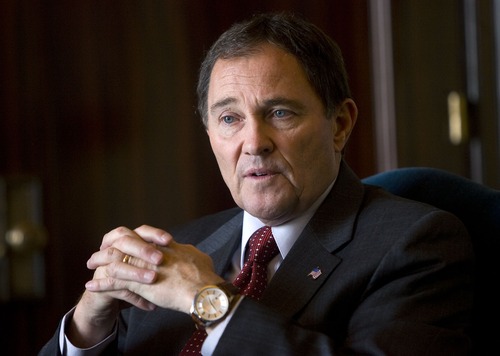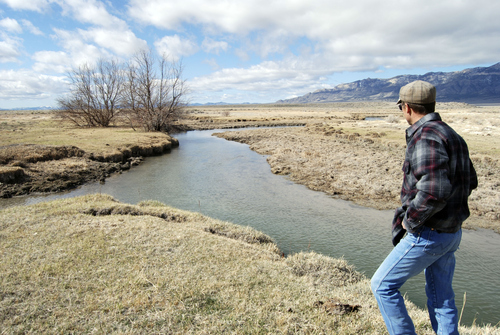This is an archived article that was published on sltrib.com in 2013, and information in the article may be outdated. It is provided only for personal research purposes and may not be reprinted.
Water leaders, certain Utah Gov. Gary Herbert made a bad decision when he rejected the Snake Valley water deal last month, are asking him to reconsider.
The legislators and water experts on the Utah Water Development Commission voted Tuesday to send a letter urging Herbert to reverse course and sign a Utah-Nevada agreement that, in their view, best protects Snake Valley water rights and statewide interests.
Washington County Water Conservancy District Director Ron Thompson said he felt the deal was sensible and solid, and he was mystified about the objections raised by Snake Valley leaders whose protests drove the governor to reject it. Now, he said, the water is at risk, along with the state's reputation for above-board dealing.
"Those people have probably left themselves exposed, and then the comity of how the states can work together is jeopardized," Thompson said.
Not voting were members of the Herbert administration, including Department of Environmental Quality Director Amanda Smith, Department of Natural Resources Director Mike Styler and Deputy Chief of Staff Mike Mower. Commission member Darrell H. Mensel voted "no."
Afterward, Mower told the panel that the administration wouldn't regard the commission's move as "a hostile act."
"Utah will do everything it can to protect its water, its water rights and to protect Utah's environment from St. George up to Logan," Mower said. "We care about it all, and we're continuing to focus on that."
Mower told how Herbert had worked long and hard to vet out the pact — fielding a report by three water "wise men" and soliciting the views of local leaders and Snake Valley residents — before announcing on April 3 he was rejecting it. Nearly four years in the making, it divvied rights to an aquifer beneath Snake Valley with Nevada, which already signed the deal and which was helping the Southern Nevada Water Authority to secure and develop water rights for a multibillion-dollar 285-mile pipeline the water authority plans to build to Las Vegas.
"A majority of local residents do not support the agreement with Nevada," Herbert said when he announced his decision shortly after town hall meetings in EskDale and Partoun. "Therefore, I cannot in good conscience sign the agreement because I won't impose a solution on those most impacted that they themselves cannot support."
Ordered by Congress in 2004, the agreement would have divided the water equally, annually allotting 66,000 acre-feet of water — more than 21 billion gallons — to each state.
Many felt that was unfair because Utah historically has been allocated more because most of the valley's arable land is on the Utah side of the state line. Nevada has argued, however, that most of the recharge occurs on its side of the aquifer, from snow in the Snake Range.
Others have said the idea of extracting 132,000 acre-feet each year is fiction, that the actual amount of water available could be far less. (An acre-foot, or 326,000 gallons, can support two to four homes' annual water use.)
Whether or not the deal is open for renegotiating is unclear at this point. Mower told the commission that Nevada still hasn't responded to Herbert's announcement.
But Attorney Warren Peterson, one of the "wise men" who advised Herbert to sign the deal, hopes the deal is still on the table. He advocated a "reset" that would allow Herbert to sign the "imperfect [but] good-enough" agreement. He blamed the news media for misinforming the ranchers and locals whose emotional appeals prompted the governor to drop it.
"The sound bite, 'we can have crops or craps,' is entertaining," he said, referring to one rancher's attention-grabbing assessment. "But there's really no probative value in it."
Zach Frankel, director of the Utah Rivers Council, complained that the commission listened to Peterson's "one-sided presentation" but failed to ask for public input. His group supported Herbert's decision and came prepared Tuesday to tell the commission why.
"All I can say," he said, "is arrogance rarely leads to good public policy."
The commission wants Herbert to respond by its next meeting in June.
Twitter: @judyfutah —
Snake Valley water timeline
2004 • Congress orders Utah and Nevada to work out an agreement on allocation and management of groundwater resources in Snake Valley.
August 2009 • The two states produce a water-sharing agreement saying 132,000 acre-feet of water per year will be made available for distribution. Each state will get 66,000 acre-feet or about 21.5 billion gallons.
Jan. 6, 2010 • Gov. Gary Herbert's spokeswoman says he is ready for Utah Department of Natural Resources Director Mike Styler to sign the agreement.
Jan. 8, 2010 • Herbert's spokeswoman says that before signing, the governor wants to address concerns of Millard County commissioners and Salt Lake County Mayor Peter Corroon, who want more scientific study.
Jan. 28, 2010 • The Nevada Supreme Court rules on a Las Vegas water-rights case, which Styler later says will delay a decision on the agreement until at least 2011.
August 2011 • Representatives of the Utah Farm Bureau, Great Basin Network and Goshute Tribe warn at a public hearing that pumping water from West Desert aquifers will harm Snake Valley agriculture and Wasatch Front air quality.
August 2012 • Southern Nevada Water Authority General Manager Pat Mulroy sends an email to her board saying it should sue Utah for failure to sign the agreement.
October 2012 • Three water attorneys asked by Herbert to review the agreement conclude it would be an "equitable" deal for Utah. In response, the Millard County Commission says a 50-50 split of water with Nevada is nonsensical because Utah has historically used the most water.
March 20, 2013 • Herbert visits with residents in EskDale and Partoun, where he tells them that without the agreement, Nevada is free to apply for the water rights now and develop them without considering Utah's concerns.
April 3, 2013 • Herbert announces he has decided against signing the water-sharing agreement.
May 14, 2013 • The Utah Water Development Commission votes to ask Herbert to reconsider his decision.





